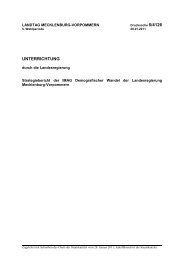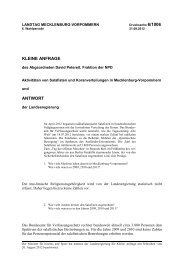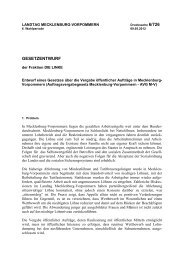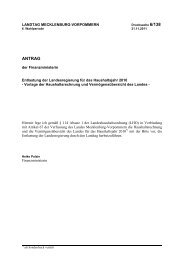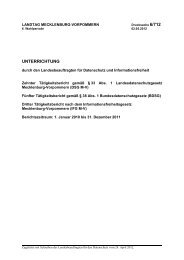Baltic Rim Economies - Baltic Port List
Baltic Rim Economies - Baltic Port List
Baltic Rim Economies - Baltic Port List
Create successful ePaper yourself
Turn your PDF publications into a flip-book with our unique Google optimized e-Paper software.
Expert article 889 <strong>Baltic</strong> <strong>Rim</strong> <strong>Economies</strong>, 21.12.2011 Quarterly Review 5�2011<br />
Modernization of public health care system in Russia<br />
By Sergey Shishkin<br />
Russia significantly lags behind industrialized countries by key<br />
health indicators. Although over the past several years mortality<br />
rate has notably dropped from 16.1 deaths per 1,000 population in<br />
2005 to 14.2 deaths per 1,000 population in 2010, this level is still<br />
very high compared to European countries (9.6 in EU, 2009).<br />
Probability of dying aged 15-60 years is almost twice as high in<br />
Russia as Europe’s median: 269 deaths vs 146 deaths per 1,000<br />
population (2009). Morbidity rate in the country keeps growing.<br />
Funding of health care in Russia is several times lower, while<br />
the rights of citizens to health care are comparable to those<br />
enjoyed by people in the industrialized countries. The overall<br />
health care expenditure as a share of GDP is almost 1.7 times<br />
lower than in the EU countries (5.2% vs 9% in 2008), while<br />
government health care spending as a share of GDP is twice as<br />
low (3.4% vs 6.9%). In absolute terms the Russian state spends<br />
3.9 times less on health care needs of one person than the EU<br />
median ($ 567 US vs $ 2,203 US by purchasing power parity,<br />
2008).<br />
The importance of health problems and the need to modernize<br />
the health system to assure social and economic progress of the<br />
country have been clearly realized by the Russian government. In<br />
recent years the government has indeed done quite a lot to<br />
improve the health care system. Health care has become a priority<br />
in budget policy. Public funding of health care increased in 2010 in<br />
1.4 times in real terms in comparison with 2005.<br />
The decline of mortality since 2006 may be partly at¬tributed to<br />
large-scale health programs undertaken by the government such<br />
as the Priority National Project "Health" started in 2006 and the<br />
Program of supplementary free drugs supply for selected<br />
categories of population, including the disabled and veterans<br />
initiated in 2005, as well as rising public funding of health care.<br />
The funding of the Project “Health” has added another 10<br />
percent to public health funds. The Project includes investments in<br />
primary and tertiary care, increase of primary care workers’ salary,<br />
vaccination, subprograms for cardio-vascular and oncology<br />
diseases, urgent care for victims of car accidents, etc. The<br />
implementation of the Project has provided for substantial<br />
upgrading of medical equipment in local clinics, and has increased<br />
the amount of free tertiary care services, regular medical screening<br />
services, disease prevention services, etc.<br />
The new stages of reform began in 2010 with the adoption of<br />
the new law on compulsory health insurance. The main change in<br />
its design is centralization of funds and administration. That was<br />
inspired by the willingness to ensure sustainability of CHI funds<br />
collection and equity in its distribution among regions.<br />
Government increased payroll tax for health insurance from<br />
3.1% to 5.1% in 2011. This surplus of funds has been used for<br />
financing two years programs of health care modernization<br />
elaborated in each Russian region.<br />
The law on the foundation of health protection of citizens in the<br />
Russian Federation was adopted last November. This law<br />
envisages centralization of health care administration in the<br />
subjects of the Russian Federation: a regional authority and<br />
regional compulsory health insurance fund concentrate<br />
administrative and financial resources for all regional health care<br />
system. Municipalities have yet very low responsibility for health<br />
development. This reform will facilitate modernization of medical<br />
facilities network in the regions. However it creates risks of<br />
disengagement of municipalities from any health policy.<br />
Both new laws have created some preconditions for<br />
development competition among insurers and among health care<br />
providers. The citizens have got the right of free selection of health<br />
insurance company and outpatient clinic for primary care. They will<br />
have also the opportunity to choose physician and facility for<br />
specialized outpatient and inpatient care from the set of providers<br />
that should be proposed for patient by physician who makes the<br />
referral for medical services that he isn’t able to provide<br />
themselves.<br />
43<br />
However, despite obvious positive dynamic in health care system<br />
modernization current measures are not enough to resolve its long<br />
standing problems.<br />
The continuum of health care is still heavily dominated by<br />
curative services provided by health care institutions. At the same<br />
time, attention given to measures designed to promote healthy life<br />
style, sports and wellness, healthier environment is not adequate<br />
to the role such measures can play in reducing morbidity and<br />
mortality compared to health care per se.<br />
The urgent problems are inadequate and sharply differentiated<br />
actual accessibility to quality health care, inadequate protection of<br />
patients’ rights, risks of unaffordable out-of-pocket payments<br />
forced on patients for treatment, which is formally free of charge<br />
(29% of patients have to pay out-of-pocket to get needed medical<br />
services, and 56% of hospitalized patients do this under-the-table).<br />
Existing health financing mechanisms provide insufficiently<br />
strong incentives for health care providers and insurance<br />
companies to make them truly motivated and committed to<br />
sustaining the health of the citizens.<br />
Health care continues to be characterized by deep structural<br />
disproportions. In particular, inpatient care institutions are strained<br />
due to excessive workload, while outpatient services remain<br />
underdeveloped. The efforts of different physicians and health care<br />
providers that work with a patient are not sufficiently coordinated.<br />
It is noteworthy that approximately half of the Russian<br />
population (53%) believes that health care as the branch of<br />
economy is in poor condition.<br />
There is a need to shift the focus of public policy towards<br />
restructuring health care system. Better health outcomes for the<br />
populationwill be achieved through establishing an integrated,<br />
transparent and effective health care system. This is a system that<br />
provides for intersectoral approach to health care, coordination of<br />
activities among organizations that deliver different types of care,<br />
involvement of patients as active partners of health care providers<br />
in prevention, diagnostics and treatment of illnesses. This is a<br />
system that provides for implementation of clear and feasible<br />
guarantees of free health services, ensuring legal, clear and fair<br />
conditions for receiving health services for a fee. This is a system<br />
in which all stakeholders are motivated to achieve maximum social<br />
and health outcomes per the unit of cost.<br />
Modernization of the Russian health care system requires an<br />
increase of public funding by 1% of the GDP to 2020 as a<br />
minimum, and by 3% of the GDP as a desirable maximum.<br />
However, the crucial factor for the success of modernization of the<br />
health care system is not mere money but persistency of the<br />
government in the implementation of rational system of health care<br />
financing and delivery.<br />
Sergey Shishkin<br />
Dr. Sc., Professor<br />
The National Research University<br />
Higher School of Economics<br />
Moscow<br />
Russia<br />
� Pan-European Institute � To receive a free copy please register at www.tse.fi/pei �




